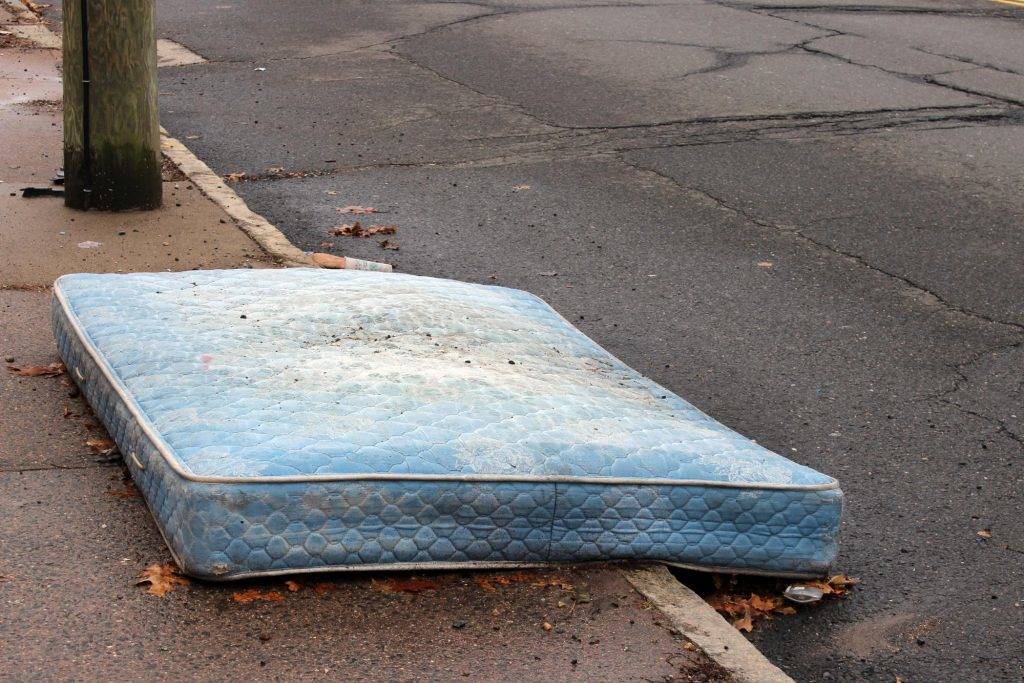When you spend hundreds – or even thousands – of dollars on a new mattress, it’s reasonable to expect that it will last for many years. However, even the most expensive, high-quality mattresses don’t last forever, and will eventually need to be replaced.
The question is, how do you determine when a mattress is too old? The answer can depend on the type of mattress you have. For instance, traditional innerspring mattresses typically need to be replaced every eight to 10 years, while latex mattresses can potentially last closer to two decades. Sometimes, it’s obvious that it’s time for a new sleeping surface, such as when a spring pops through the fabric.
You don’t need to wait until your mattress causes you bodily harm to head to the mattress store, though. There are usually other clear signs that your mattress is too old; if you ignore them, you could be putting your sleep – and your health – at risk.
Effects of a Mattress That Is Too Old
Almost everyone has slept on a mattress that’s old or uncomfortable. But when your mattress keeps you awake at night, disturbs your sleep, or causes you to wake up in pain, you are actually doing more harm to your overall health than you might think.
Sleeping on an old mattress can contribute to a long list of ailments, not the least of which is a sore back and stiff joints upon waking. Some of the health concerns that can stem from a subpar mattress include:
- Sleep disorders like snoring or apnea, which are worsened by an unsupportive mattress.
- Respiratory illnesses brought on by allergens, including dust mite feces, dead skin cells, and more. It’s common for mattresses to contain mold and mildew spores, for instance, from the sweat absorbed by the mattress over the years.
- Heart disease, obesity, memory problems, and more can all be exacerbated by inadequate sleep. For example, not getting enough sleep has been proven to increase your risk of heart disease and can make you crave fatty foods, which contributes to weight gain.
That’s not even considering the effect that inadequate sleep can have on your mood and emotional well-being. Therefore, if you are constantly tired and cranky, it might be time to think about buying a new mattress.
8 Signs Your Mattress Is Too Old

- Age: Again, the “standard” recommendation for buying a new mattress is about every eight years. However, that can vary according to the type of mattress you have and how your sleeping situation has changed in the past few years. For instance, your mattress might only be four or five years old, but if you’ve gained weight or a sleeping partner in that time, it might not be as comfortable as it once was. Assuming that everything has stayed the same, though, you should plan on replacing innerspring mattresses every seven to 10 years. Memory foam mattresses don’t last as long, and typically need replacing every five to seven years, while hybrid memory foam and innerspring mattresses might last a few more years. Latex mattresses last the longest and might even come with warranties for 20 years or longer. You can typically wait at least 10 to 15 years before replacing one of these mattresses.
- How you feel when you wake up: One telltale sign you need a new mattress is that you wake up feeling sore and under-rested. Sleep is a time for your body to relax and rejuvenate. Ideally, your mattress should provide enough support and pressure point relief so you feel like you’re floating. If you’re spending most of the night trying to find a comfortable position, you’re not going to get that all-important rest and will instead wake up with aches and pains. A good rule of thumb is to consider how long it takes for you to feel better. If you can stretch out your aches and pains within 15 to 30 minutes after waking up, your mattress is likely the problem.
- Allergies: If you suddenly develop allergies or if your existing allergies or respiratory conditions worsen, your mattress may be the root of the problem (especially if you don’t clean it often enough). Regularly vacuuming, rotating, and flipping your mattress, as well as covering it with an allergy-blocking cover, can help reduce the buildup of allergens like dust mites. Still, your mattress can become a problem even with the best care.
- How you feel when you sleep elsewhere: There’s something about being on vacation and sleeping in a hotel that makes everyone rest just a little better. But when you sleep somewhere other than your home, whether it’s a luxury hotel or your in-laws’ guest room, pay close attention to how you feel when you wake up. If you feel more rested and have fewer aches and pains than usual, you should probably upgrade your mattress.
- Noise: Mattresses are specifically designed to be quiet. At most, you should only hear the slightest of rustling when you or your sleeping partner roll over or get out of bed. If your bed is especially noisy and squeaks every time you move, it’s time for a replacement. Not only does this mean the springs are losing their bounce, but the noise is likely to disturb your sleep.
- Visible wear: A wayward spring poking through the mattress isn’t the only sign of wear to look out for. If your mattress is lumpy, has visible sagging areas, or exhibits uneven wear, it’s time for a new one.
- You have changed: A mattress that was perfect for you a decade ago may no longer be the right choice. If you’ve gained or lost weight or changed your sleeping habits (such as sleeping with a partner or no longer sleeping with a partner), then your mattress may not be the right fit anymore.
- Changes to the mattress: With memory foam mattresses, in particular, the actual mattress can change over time and become uncomfortable. Memory foam is designed to conform to your weight and bounce back to its original shape when the pressure is removed. Over time, though, the memory foam cells can lose their ability to bounce back. Even high-quality memory foam mattresses can change over time, so if your once-cloudlike mattress is no longer comfortable, this could be the reason.
How to Buy a New Mattress

These days, traditional innerspring mattresses remain the most popular option, but memory foam mattresses, especially the “bed in a box” type compressed and shipped directly to your door, are gaining in popularity. Some mattresses are hybrids, combining springs topped with memory foam. Regardless of the type of mattress, though, manufacturers use a standard scale for determining the firmness: soft, medium-firm, and firm. Most use a score to describe the firmness: The lower the number, the softer the mattress.
The majority of mattresses fall into the medium or medium-firm category, with a firmness rating of five to seven. However, that is only part of the equation. You also need to consider other factors, such as your sleeping position, whether you sleep hot (memory foam is known to be hotter than other types of mattresses), and whether the mattress transfers motion if you sleep with a partner. Ideally, you should test a mattress in a store for at least 20 minutes (and test it more than once).
Even if you do test a mattress, you should choose one with a generous return policy or sleep trial so you can sleep on it for a few weeks or months. A mattress that feels great in the store might prove uncomfortable for a full night, so you’ll want the option to bring it back and select something else if necessary.
Sleeping on an old or worn-out mattress won’t only cause you severe discomfort, but it can also make you sick. Nothing lasts forever, but when you know the signs, you can replace your mattress before it becomes a serious problem and avoid suffering through sleepless nights.